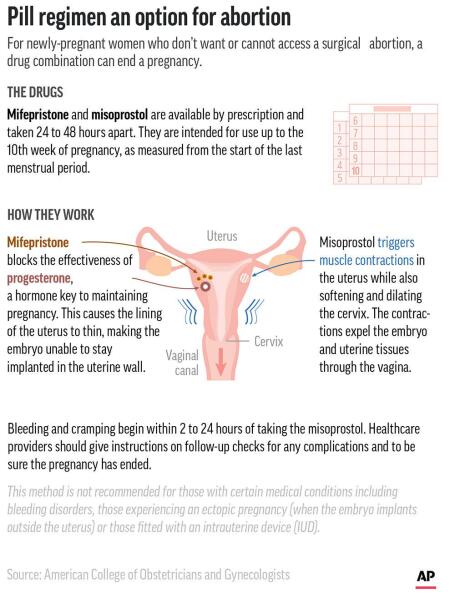Bleeding after a medication abortion can last up to two weeks. It’s generally similar to a menstrual period, but can be heavier at times.
Undergoing a medication abortion brings about a sequence of physical reactions, one of which is bleeding. This is a natural part of the process as the body expels the uterine lining. Women experience this differently, with some having light bleeding and others heavier flows.
It’s vital to be aware that while the bleeding is usually heaviest within the first few days, spotting or bleeding lightly may continue for several weeks. During this time, paying attention to personal comfort and using sanitary pads can help manage the bleeding. It’s crucial to follow your healthcare provider’s guidance and attend all follow-up appointments to ensure the abortion process is complete and to address any concerns regarding bleeding or other symptoms.
Medication Abortion Basics
Exploring the fundamentals of medication abortion reveals essential details. This method offers an alternative to surgical procedures. Understanding the duration of bleeding post-abortion is vital. Let’s delve into the basics.
What Is Medication Abortion?
Medication abortion, also known as the abortion pill, is a safe and effective way to end an early pregnancy. This method uses medications to terminate a pregnancy without surgery. It typically involves two different drugs. These drugs cause the body to stop the growth of the pregnancy and expel the contents of the uterus.
Drugs Used In The Process
The process uses a combination of two primary drugs:
- Mifepristone – This drug blocks progesterone, a hormone necessary for pregnancy continuation.
- Misoprostol – It causes the uterus to contract and expel the pregnancy tissue.
These medications are usually taken hours or days apart. The process can last a few days to a few weeks.
| Drug | Function | Timeframe |
|---|---|---|
| Mifepristone | Hormone blocker | First dose |
| Misoprostol | Induces contractions | Follow-up doses |
Bleeding After Medication Abortion
Understanding what to expect after a medication abortion is vital for physical and mental comfort. One of the primary concerns is bleeding. This normal bodily reaction signals the process beginning to work.
Normal Duration Of Bleeding
Bleeding varies from person to person but typically lasts for one to two weeks. It’s normal to see fluctuating bleeding patterns.
- Light bleeding or spotting may continue up to 4 weeks.
- Blood flow should progressively decrease over this time.
Contact a healthcare provider if bleeding heavily persists past two weeks.
When To Expect Bleeding To Start
Bleeding usually begins within a few hours after taking the medication. Expectations include:
- Initial bleeding can start 1-4 hours post medication.
- It might commence with cramping or pain.
- The heaviest bleeding often happens in the first few days.
| Time After Medication | Bleeding Expectation |
|---|---|
| 1-4 hours | Begins with light-to-heavy flow |
| Next few days | Heaviest flow |
| Up to 2 weeks | Light bleeding or spotting |
For any signs of complications or concerns, reach out to medical professionals immediately.
Factors Influencing Bleeding Duration
Bleeding after a medication abortion varies from person to person. Understanding the various factors helps manage expectations. Let’s explore why bleeding length can differ significantly.
Individual Health Conditions
Different health conditions affect how long you bleed after an abortion. This can include:
- Anemia or bleeding disorders may prolong bleeding.
- Uterine fibroids or abnormalities can change bleeding patterns.
- Hormonal imbalances might affect recovery.
- The presence of an infection could extend bleeding duration.
Variations Due To Medications
Medications go hand in hand with bleeding after an abortion. They include:
- Pain relievers, such as ibuprofen, might increase bleeding risks.
- Birth control can influence the menstrual cycle and bleeding.
- Herbal supplements may interfere with bleeding duration.
Note the importance of following a doctor’s advice on medication post-abortion.

Credit: www.bloomberg.com
Comparing Bleeding Patterns
Comparing Bleeding Patterns after a medication abortion is important. It helps to understand what to expect. Each experience can vary. Factors include the type of abortion and personal medical history.
Medication Vs. Surgical Abortion
Bleeding after a medication abortion typically lasts one to two weeks. This bleeding can be heavy at first. It can feel like a heavy period. Over time, it should decrease.
With a surgical abortion, bleeding may last for a few days. This is generally lighter compared to medication abortion. Spotting can occur up to two weeks.
- Medication abortion: 1-2 weeks of bleeding.
- Surgical abortion: A few days to 2 weeks of spotting.
First-time Vs. Repeat Abortion
For a first-time abortion, bleeding patterns can feel unpredictable. The body adjusts to the process. Duration can differ widely among individuals.
A repeat abortion might have a more predictable pattern. The body may adjust to the process. Yet, personal health still plays a role.
| Type of Abortion | Expected Bleeding Duration |
|---|---|
| First-time | Variable |
| Repeat | May be more predictable |
Complications To Watch For
Complications to Watch For after a medication abortion are rare but important to recognize. While most symptoms are standard, some can signal a need for immediate medical attention.
Excessive Bleeding
Although bleeding after a medication abortion is normal, there are times when it may be too much. Keep an eye out for any bleeding that soaks through two or more pads in an hour, for two hours straight. If this occurs, it’s a sign that you should contact your healthcare provider straight away. Here’s what to watch for:
- Heavy bleeding that doesn’t slow down
- Passing large clots larger than a lemon
- Weakness or dizziness
Signs Of Infection
Infection can be another serious complication. Be aware of the following signs which could indicate an infection:
- Fever of 100.4°F or higher
- Foul-smelling discharge
- Severe abdominal pain
If you experience these symptoms, it’s crucial to seek medical help immediately.
Managing Bleeding And Discomfort
After a medication abortion, it’s common to experience bleeding and discomfort. Managing these symptoms is key for your well-being. Here, we will explore various techniques and best practices to help you through the recovery process.
Pain Management Techniques
Understanding how to ease pain is crucial. Over-the-counter pain relievers like ibuprofen can significantly reduce discomfort. Always follow the dosage instructions provided by your healthcare provider. Applying a heating pad to your lower abdomen helps too. Gentle exercise, such as walking, can also decrease pain and promote healing. Rest is important, but moving around at times helps with circulation.
- Use ibuprofen as directed
- Apply a heating pad
- Engage in gentle exercise
- Ensure adequate rest
Best Practices For Hygiene
Keeping the vaginal area clean is essential to prevent infection. Use mild soap and warm water when showering. Avoid baths, hot tubs, and swimming for at least two weeks. Change your sanitary pads regularly, at least every 4 to 6 hours. Do not use tampons until your follow-up visit confirms it’s safe. Wash your hands before and after changing pads. Regular pad changes and proper hand hygiene protect against infection.
| Dos | Don’ts |
|---|---|
| Shower with mild soap | Avoid baths and swimming |
| Change pads regularly | Skip using tampons |
| Wash hands frequently | Forget follow-up checkups |
Following a proper hygiene routine reduces risks and supports a smoother recovery after a medication abortion. Always consult your healthcare provider for personalized advice tailored to your specific needs.
Emotional Impact Of Abortion
The Emotional Impact of Abortion reaches far deeper than the physical experience. Many women find that after a medication abortion, it’s not just the body that needs to heal, but also the heart and mind.
Coping With Emotional Changes
Feeling a range of emotions after an abortion is normal. These can include sadness, relief, or confusion. It’s vital to acknowledge your feelings and allow yourself to grieve if needed.
- Take time for yourself – Rest and reflect in a comfortable space.
- Practice self-care – Engage in activities that nurture your wellbeing.
- Write in a journal – This can help process your thoughts and emotions.
Seeking Support
Support is key to healing. You are not alone. Many avenues exist to find solace and understanding.
- Talk to loved ones – Sharing with family or friends can provide comfort.
- Join support groups – Connect with those who have similar experiences.
- Consider counseling – Professional help can guide you through this time.
Remember, everyone’s journey is unique. Healing takes time. Reach out when you’re ready.

Credit: hersmartchoice.com
Follow-up Care And Consultation
Understanding the necessary follow-up care and consultation after a medication abortion is crucial. This care ensures your health and safety throughout the recovery process. It’s important to know how long bleeding may last and when to seek further medical advice.
Importance Of Post-abortion Checkups
Regular checkups after a medication abortion are vital. They help confirm that the abortion was complete and assess your overall well-being. These visits can also provide emotional support and answer any questions you may have.
- Confirm completion: A health professional checks if your body expelled all tissue.
- Physical recovery: They monitor signs of complications like excessive bleeding or infection.
- Emotional support: They offer support and resources for any emotional impact.
When To Contact A Health Professional
After your abortion, some bleeding is normal, yet certain symptoms warrant immediate medical attention.
| Contact a Professional if You Experience: |
|---|
| Heavy bleeding: Soaking two or more pads an hour for two hours. |
| Severe pain: Not relieved by painkillers or worsening. |
| Fever: A temperature of 100.4°F (38°C) or higher for 24 hours. |
| Unusual discharge: A foul-smelling discharge may indicate an infection. |
Myths Vs. Facts
Bleeding after a medication abortion can be a source of confusion. Various myths surround it. Separating myth from fact is key for clarity and peace of mind. Let’s debunk some common misconceptions and provide evidence-based clarifications.
Common Misconceptions
Bleeding duration and patterns can vary widely among individuals. Here are some myths that need dispelling:
- Bleeding stops within a few days – Many think it only lasts for a short period.
- Heavy bleeding is a sign of complications – Some assume that heavy bleeding means something is wrong.
Evidence-based Clarifications
Let’s set the record straight with facts:
- Bleeding can last up to two weeks, sometimes longer. Light bleeding or spotting may continue beyond this.
- Heavy bleeding is normal for some, especially in the first few days. If concerned, contact a healthcare provider.
Fertility And Future Pregnancies
After a medication abortion, many individuals have concerns about their ability to conceive in the future. This section aims to address common questions regarding fertility and planning for subsequent pregnancies following an abortion with medication.
Effect On Fertility
It’s important to note that medication abortion does not harm fertility. Studies show that normal ovulation can resume within a few weeks post-procedure. The bleeding experienced does not indicate a decrease in fertility.
Bleeding duration varies among individuals, typically lasting from a few days to two weeks. It’s a natural part of the healing process and does not affect future pregnancy chances.
- Normal menstrual cycle returns in 4 to 8 weeks.
- Ovulation can occur even before the first period post-abortion.
Planning For Subsequent Pregnancies
If planning future pregnancies, consider these guidelines:
- Consult a healthcare provider about when it’s safe to try conceiving again.
- Use contraception if avoiding immediate pregnancy.
- Understand that fertility returns quickly post-abortion.
Post-abortion, initiate prenatal care early once a new pregnancy is confirmed. A previous medication abortion does not complicate a future pregnancy.
Discuss prenatal vitamins and lifestyle adjustments with a professional to support a healthy next pregnancy.

Credit: hersmartchoice.com
Frequently Asked Questions On How Long Do You Bleed After Medication Abortion
How Long Is Bleeding After Medication Abortion?
Bleeding varies, but typically lasts one to two weeks.
Is Heavy Bleeding Normal Post-medication Abortion?
Mild to moderate bleeding is common; heavy bleeding may require medical attention.
Can Bleeding Duration Vary After Medication Abortion?
Yes, bleeding duration varies depending on individual health factors.
What Signs Indicate Complications After Medication Abortion?
Excessive bleeding, fever, and severe pain could signal complications.
How To Manage Bleeding After Medication Abortion?
Use sanitary pads, avoid tampons, and rest to manage bleeding post-abortion.
Does Bleeding Intensity Decrease Over Time?
Bleeding intensity usually decreases over days following the abortion.
When To Seek Medical Advice For Post-abortion Bleeding?
Seek immediate medical advice for heavy or prolonged bleeding.
Can Medication Abortion Cause Irregular Periods?
It can cause temporary menstrual irregularities in subsequent cycles.
What To Avoid During Bleeding After Medication Abortion?
Avoid tampons, intercourse, and strenuous activity during this time.
Are Follow-up Appointments Necessary After A Medication Abortion?
Yes, follow-up appointments are important to ensure complete recovery.
Conclusion
Bleeding duration post-medication abortion varies for each individual. Generally, it lasts one to two weeks. It’s important to follow up with your healthcare provider to ensure a safe recovery process. Remember, personal care and attention to any unusual symptoms are critical during this time.
Stay informed and prioritize your health.



